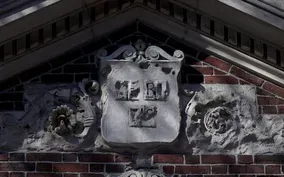
What trouble in the bond market means for your investments
Clip: 5/13/2025 | 7m 22sVideo has Closed Captions
What trouble in the bond market means for your investments and the economy
The April inflation numbers show that prices did not jump significantly after President Trump imposed higher tariffs and then, in many cases, delayed them. But the longer term is still uncertain. The market response to the back-and-forth over trade has been volatile, particularly when it comes to the bond market. Economics correspondent Paul Solman explains.
Problems with Closed Captions? Closed Captioning Feedback
Problems with Closed Captions? Closed Captioning Feedback
Major corporate funding for the PBS News Hour is provided by BDO, BNSF, Consumer Cellular, American Cruise Lines, and Raymond James. Funding for the PBS NewsHour Weekend is provided by...

What trouble in the bond market means for your investments
Clip: 5/13/2025 | 7m 22sVideo has Closed Captions
The April inflation numbers show that prices did not jump significantly after President Trump imposed higher tariffs and then, in many cases, delayed them. But the longer term is still uncertain. The market response to the back-and-forth over trade has been volatile, particularly when it comes to the bond market. Economics correspondent Paul Solman explains.
Problems with Closed Captions? Closed Captioning Feedback
How to Watch PBS News Hour
PBS News Hour is available to stream on pbs.org and the free PBS App, available on iPhone, Apple TV, Android TV, Android smartphones, Amazon Fire TV, Amazon Fire Tablet, Roku, Samsung Smart TV, and Vizio.
Providing Support for PBS.org
Learn Moreabout PBS online sponsorshipGEOFF BENNETT: The April inflation numbers show that prices did not jump significantly as President Trump imposed higher tariffs and then in many cases delayed them.
But the longer term is still uncertain, and the market response to the back-and-forth over trade has been volatile, especially when it comes to the bond market.
Our economics correspondent, Paul Solman, explains.
DONALD TRUMP, President of the United States: Yesterday, we achieved a total reset with China.
PAUL SOLMAN: The news this week that China and the U.S. agreed to pause the tariff war was a boon for investors, so anxious of late that the president had already paused most tariffs last month.
DONALD TRUMP: They were getting a little bit yippy, a little bit afraid.
PAUL SOLMAN: Yips, originally a golf term for anxiety on the links.
The "they" the president was referring to, investors in the bond market who buy and sell U.S. government IOUs called bonds or Treasury securities.
Here's longtime market maven Ed Yardeni to explain.
EDWARD YARDENI, Yardeni Research: Well, Treasury securities are the dead instruments that are issued by the U.S. Treasury to pay for the spending of the United States government that isn't covered by taxes.
PAUL SOLMAN: Finance professor Laura Veldkamp puts it this way: LAURA VELDKAMP, Columbia Business School: A bond is an IOU that the U.S. government issues and it promises to pay the buyer of that bond back in the future for the money that is borrowed with interest.
PAUL SOLMAN: How much interest depends on a few things, the maturity of the IOU, 30 days, a year, 10 years 30.
That is, how long before the U.S. is obliged to pay you back what it borrowed?
Expected inflation in the meantime -- you don't want to be holding an IOU paying 2 percent a year, say, when inflation is, I don't know, 5 percent, since you would lose money every year.
The likelihood the U.S. is going to stiff you and default.
But, ultimately, the interest rate depends on buyer demand.
LAURA VELDKAMP: If the buyers are really eager to buy U.S. government bonds, they might be willing to take them with a low rate of interest.
But if us bonds start to look less desirable for one of many reasons, then the interest would be higher.
PAUL SOLMAN: Now, there's a key reason for the desirability of U.S. treasuries, according to finance executive Doug Dachille.
DOUGLAS DACHILLE, Former Chief Investment Officer, AIG: Treasuries are basically viewed as having no credit risk.
No one really believes that the U.S. government is going to default.
PAUL SOLMAN: Plenty of countries have defaulted over the years but would the U.S. ever default on its Treasuries?
EDWARD YARDENI: That's nuts.
I mean, that makes absolutely no sense.
We want to maintain the full faith and credit of the U.S. government.
And the way the U.S. government does that is by paying off its debts without changing the rules.
PAUL SOLMAN: So, folks don't worry much about default, which is why Treasury securities, U.S. bonds, have long been considered among the safest of all investments.
LAURA VELDKAMP: U.S. government bonds have been a global safe asset since about the end of World War II.
And what that means is that everybody trusts that U.S. government debt will retain its value.
PAUL SOLMAN: So then why would investors get the yips and start selling their bonds, driving up Treasury rates that are tied to all kinds of consumer loan rates?
Well, maybe they think inflation is going to jump because of increased tariffs, making foreign goods more expensive, and higher inflation would make today's bonds worth less than tomorrow's.
LAURA VELDKAMP: If the interest goes up on newly issued bonds, then the old bonds that are out there that still have lower interest payments become less desirable in comparison to those new bonds with the higher interest rates.
PAUL SOLMAN: And that concern that interest rates would rise brings out the so-called bond vigilantes.
EDWARD YARDENI: If you're selling the bonds because you don't like the policies, you're saying you think they will be inflationary, they will be even larger deficits, then you're a bond vigilante.
PAUL SOLMAN: Yardeni coined to turn back in 1983 to describe investors whose selling put pressure on the government to change its economic policies.
ACTOR: It's the vigilante.
EDWARD YARDENI: If the sheriff in town isn't going to do the job, the vigilantes will push bond yields up.
PAUL SOLMAN: By selling.
But in April, there was another driver of the yips, hedge funds, private pools of investor money, which use a lot of debt, also called leverage, to make their investments.
LAURA VELDKAMP: A bunch of financial institutions, like hedge funds, had used U.S. government bonds as collateral, meaning I will lend you some money, but if you don't repay me back, I'm going to get those bonds that you have, because they're sure that those bonds will still have a lot of value in case you need to collect that collateral tomorrow.
PAUL SOLMAN: Problem was, bond rates were spiking.
So today's bonds were losing money and thus losing value as collateral.
Lenders told the hedge funds, we need more collateral.
The hedge funds appear to have begun selling their bonds to come up with it.
DOUGLAS DACHILLE: It's a vicious cycle, because you lose money, you sell.
As you sell, you lose more money.
So you create this spiral of selling.
LAURA VELDKAMP: And so what we see is a rapid unwinding.
PAUL SOLMAN: And that's what happened with Lehman Brothers, right?
LAURA VELDKAMP: That's exactly what happened with Lehman Brothers.
PAUL SOLMAN: Which back in 2008 triggered a crisis so severe the government bailed out the next big institution spiraling down, AIG, and then drenched the financial system with cash.
The recent concern?
Because U.S. Treasuries are so critical to the whole system, another potential death spiral a la 2008.
Dachille, who studied medicine before getting into finance and led investments at AIG post-crash, says the fear of a near-death experience always lurks in a system like ours.
DOUGLAS DACHILLE: The markets generally work, but like your heart generally works.
But every so often, in some people, you develop what's called ventricular fibrillation, and that's what a treasury secretary fears, because when there's ventricular fibrillation, there's no mechanism for the body to actually restore the heart to normal rhythm.
And that's what happened with the administration.
I would say that the pause on the tariffs was kind of like a defibrillator to try to stabilize what was becoming an unstable market condition and a disequilibrium.
PAUL SOLMAN: And potentially a heart attack of the financial system?
DOUGLAS DACHILLE: Well, death.
I mean, when you get into ventricular fibrillation, if you don't defibrillate the person, the person doesn't get blood flow to the brain and they die.
PAUL SOLMAN: Well, the risk of flatlining seems especially remote now that tariffs with China have been paused.
And yet bond yields have risen again.
So, even though hedge funds don't seem yippy, and today's inflation number at least was unexpectedly low, investors just aren't loving our bonds.
Expecting future inflation maybe?
A Fed that won't lower rates?
Whatever the reason, it will have knock-on effects for most of us.
LAURA VELDKAMP: Anybody with credit card debt, anybody with a home loan mortgage, your interest rate is probably dependent on some Treasury rate that it's indexed to.
So, as the U.S. government becomes riskier, as U.S. government debt becomes riskier, it's not only going to be more expensive for the U.S. government.
It's going to be more expensive for households that have debt as well.
PAUL SOLMAN: And on that happy note, Paul Solman for the "PBS NewsHour."
Baseball reinstates Pete Rose and Shoeless Joe Jackson
Video has Closed Captions
Clip: 5/13/2025 | 5m 28s | Baseball reinstates Pete Rose and Shoeless Joe Jackson, making them Hall of Fame eligible (5m 28s)
Family reflects on 1950s U.S. deportation effort
Video has Closed Captions
Clip: 5/13/2025 | 3m 7s | Family who lived through 1950s U.S. deportation effort reflects on current climate (3m 7s)
Mideast experts weigh in on Trump's economic, defense deals
Video has Closed Captions
Clip: 5/13/2025 | 9m 5s | Mideast experts weigh in on Trump's economic and defense deals in the region (9m 5s)
Minnesota works to address disappearances of Black women
Video has Closed Captions
Clip: 5/13/2025 | 7m 18s | Minnesota works to address murders and disappearances of Black women (7m 18s)
News Wrap: Another $450 million in Harvard grants terminated
Video has Closed Captions
Clip: 5/13/2025 | 5m 14s | News Wrap: White House terminates another $450 million in grants to Harvard (5m 14s)
Students face changes as Ohio law rolls back DEI initiatives
Video has Closed Captions
Clip: 5/13/2025 | 9m 22s | Ohio students face changes on campus as new state law rolls back diversity initiatives (9m 22s)
Trump sets new course for American policy in Middle East
Video has Closed Captions
Clip: 5/13/2025 | 4m 43s | Trump arrives in Saudi Arabia as he sets new course for American policy in Middle East (4m 43s)
Providing Support for PBS.org
Learn Moreabout PBS online sponsorshipSupport for PBS provided by:
Major corporate funding for the PBS News Hour is provided by BDO, BNSF, Consumer Cellular, American Cruise Lines, and Raymond James. Funding for the PBS NewsHour Weekend is provided by...


















